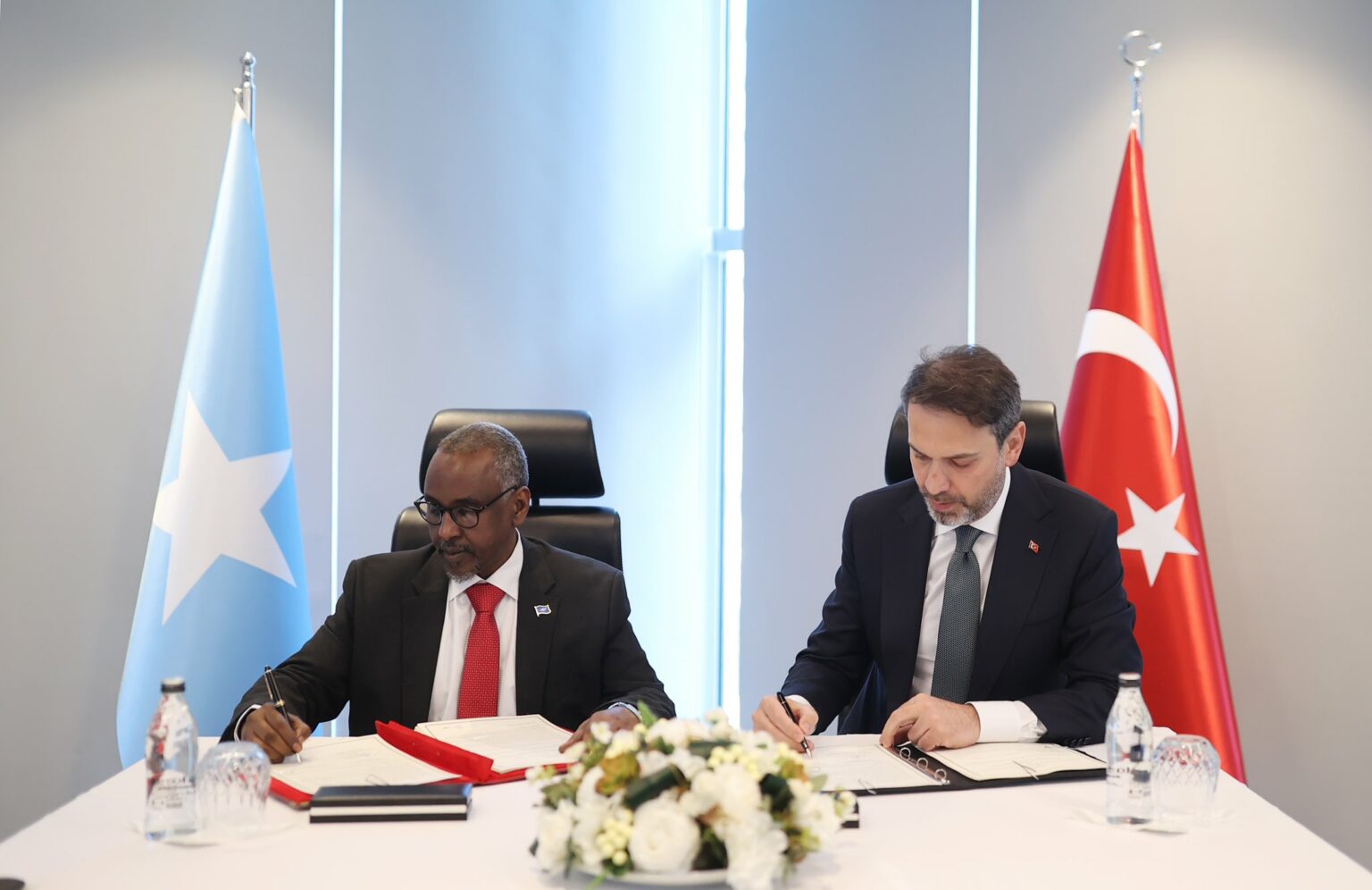Turkey has a multi-dimensional presence throughout the Horn of Africa and repeatedly emphasizes the paramount importance of regional peace.
Turkish Minister of National Defense Yasar Guler (L) welcomes Minister of Defense of Somalia Abdulkadir Muhammed Nur (C) with an official ceremony in Ankara, Turkiye on February 08, 2024.
he security and defense agreement signed between Turkey and Somalia in February 2024, although not talked about enough in Turkey, made a major impact and generated discussion globally on the role of Turkey especially in the Horn of Africa.
The impact and interaction of this 10-year agreement is likely to be felt in the region for many years. However, what does this agreement mean for Turkey and its overall Horn of Africa policy? How should we understand it in a broader perspective?
First of all, this agreement is part of the Turkish strategy in recent years whereby any crisis should be utilized to the maximum level for the benefit of Turkey’s national foreign policy. In the past, during the crisis of Qatar and the Gulf countries in 2017, Turkey acted quickly and decisively, increasing its military presence in the Gulf and opening a military/training base in Doha. After several years of criticism and complaints, it is now clear that Turkey has a firm military place in the Gulf.
What we see here is a similar case. When Ethiopia and Somaliland signed an agreement granting the former naval and commercial access to Somaliland’s coast, Somalia’s central government saw it as an existential threat. Not only did a security crisis occur, but many inside the Somali government interpreted this as a sovereignty crisis between Somalia and Ethiopia. Ankara quickly responded to the Somali request for help to the central government in Mogadishu. Ankara evaluated the crisis and signed an agreement to increase its military presence in Somalia.
This agreement is important in two aspects for Turkey. First, it will increase Turkey’s military in Somalia and possibly lead to the addition of a small airport for military planes in the military training center in Somalia, the lack of which came to the fore during the evacuations in Sudan. Second, it can clearly pave the way for Turkey’s presence in the open seas in the region and, therefore, its effectiveness in the developments in the Gulf of Aden.
The agreement is both a continuation of the deepening military relations between Turkey and Somalia in the last decade, and a reflection of the self-confidence that Somalia has gained over al-Shabaab, allowing it now to act more independently in regional politics. In addition, the agreement can be interpreted as the most effective playmaking move made by Somalia in the geopolitics of the region after 2010.
Read: Turkish Influence Expands: Turkey-Somalia Maritime Agreement in the Horn of Africa
Effects and Reflections
The United Arab Emirates is likely the country most disturbed by the Turkey-Somalia security and defense agreement. The UAE has been conducting serious diplomacy for the last year to sign a very similar or even more advanced security agreement with Somalia. However, the response from Somalia has been reluctant—which is why there is both reaction and disappointment on the part of UAE about this development.
Ethiopia also was shocked and uncomfortable with the agreement, but, at the same time, attaches great importance to relations with Turkey. Ethiopia-Turkey relations experienced their golden period in 2020-2021 when Turkey helped Ethiopia in its fight with the Tigray region by supplying drones and other military equipment. It will be difficult to return to the same period again, however, multidimensional military-security relations between Turkey and Ethiopia are at a point of no return with mutual trust on this issue being well established.
For this reason, Ethiopia, which is experiencing serious economic difficulties, does not want problems with a country with which it works closely in the field of security. Nevertheless, one should expect that we will see the reflections of Ethiopia’s discomfort with the relevant agreement in its relations with Turkey in the coming period; however, the continuously deepening security-centered relationship is likely to balance this.
Read: African Geopolitics: Risks and Opportunities
Turkey in the Horn of Africa
The most important question now is “What should Turkey do next in the Horn of Africa?” The geopolitics of the region will be reshaped as an atmosphere of insecurity has emerged: Somalia is dealing with al-Shabaab; Ethiopia is struggling with internal problems such as Tigray and Oromia; Somaliland is seeking independence; Kenya is preoccupied with domestic political issues; and the civil war in Sudan deepens and becomes a stalemate.
Turkey’s Horn of Africa policy in the 2010s was to strengthen the Sudan-Somalia line against the Ethiopia-Kenya line, and ensure the historical regional order. This approach manifested itself in Ankara’s activities that contributed to state-building efforts in Somalia and to socio-economic stability in Sudan. But in 2011, Sudan was divided into two, and a military coup and, most recently, the ongoing civil war destroyed the regional balance.
Despite this, Somalia has made progress in re-establishing order economically, politically, and militarily beyond expectations. The Somali diaspora has supported this process economically, and Somalia has presented itself as a new actor in the region. Turkey recently provided serious support to the Somali central government in the fight against al-Shabaab terrorism and made an sizable contribution to the strengthening of the country’s military.
Alongside its support to the Somalia-Sudan axis, Turkey has also established serious relations along the Kenya-Ethiopia axis. Political and military relations with Ethiopia, and commercial relations with Kenya came to the fore. This process has made Turkey one of the key countries in the region’s geopolitics.

